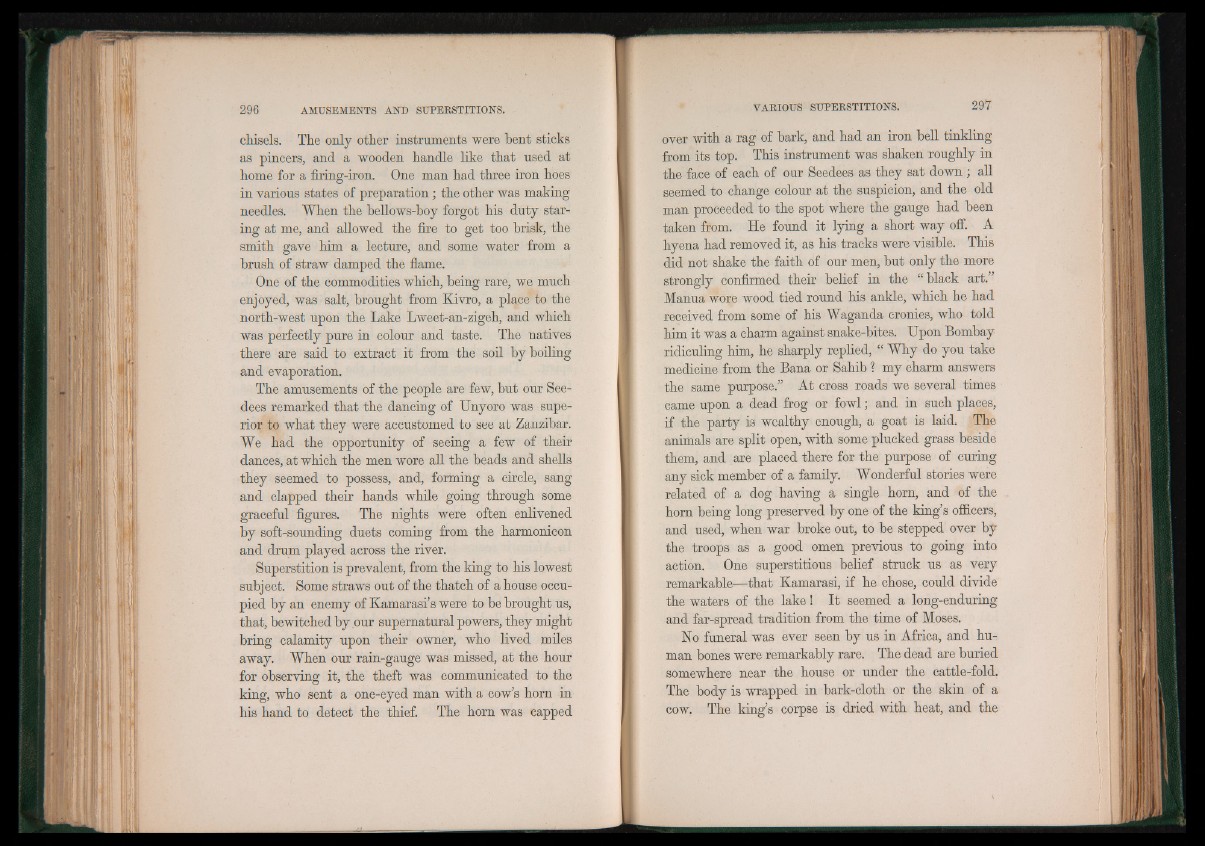
chisels. The only other instruments were bent sticks
as pincers, and a wooden handle like that used at
home for a firing-iron. One man had three iron hoes
in various states of preparation; the other was making
needles. When the bellows-boy forgot his duty staring
at me, and allowed the fire to get too brisk, the
smith gave him a lecture, and some water from a
brush of straw damped the flame.
One of the commodities which, being rare, we much
enjoyed, was salt, brought from Kivro, a place to the
north-west upon the Lake Lweet-an-zigeh, and which
was perfectly pure in colour and taste. The natives
there are said to extract it from the soil by boiling
and evaporation.
The amusements of the people are few, but our See-
dees remarked that the dancing of Unyoro was superior
to what they were accustomed to see at Zanzibar.
We had the opportunity of seeing a few of their
dances, at which the men wore all the beads and shells
they seemed to possess, and, forming a circle, sang
and clapped their hands while going through some
graceful figures. The nights were often enlivened
by soft-sounding duets coming from the harmonicon
and drum played across the river.
Superstition is prevalent, from the king to his lowest
subject. Some straws out of the thatch of a house occupied
by an enemy of Kamarasi’s were to be brought us,
that, bewitched by our supernatural powers, they might
bring calamity upon their owner, who lived miles
away. When our rain-gauge was missed, at the hour
for observing it, the theft was communicated to the
king, who sent a one-eyed man with a cow’s horn in
his hand to detect the thief. The horn was capped
over with a rag of bark, and had an iron bell tinkling
from its top. This instrument was shaken roughly in
the face of each of our Seedees as they sat down; all
seemed to change colour at the suspicion, and the old
man proceeded to the spot where the gauge had been
taken from. He found it lying a short way off. A
hyena had removed it, as his tracks were visible. This
did not shake the faith of our men, but only the more
strongly confirmed their belief in the “ black art.”
Manna wore wood tied round his ankle, which he had
received from some of his Waganda cronies, who told
him it was a charm against snake-bites. Upon Bombay
ridiculing him, he sharply replied, “ Why do you take
medicine from the Bana or Sahib ? my charm answers
the same purpose.” At cross roads we several times
came upon a dead frog or fowl; and in such places,
if the party is wealthy enough, a goat is laid. The
animals are split open, with some plucked grass beside
them, and are placed there for the purpose of curing
any sick member of a family. Wonderful stories were
related of a dog having a single horn, and of the
horn being long preserved by one of the king’s officers,
and used, when war broke out, to be stepped over by
the troops as a good omen previous to going into
action. One superstitious belief struck us as very
remarkable—that Kamarasi, if he chose, could divide
the waters of the lake! It seemed a long-enduring
and far-spread tradition from the time of Moses.
No funeral was ever seen by us in Africa, and human
bones were remarkably rare. The dead are buried
somewhere near the house or under the cattle-fold.
The body is wrapped in bark-cloth or the skin of a
cow. The king’s corpse is dried with heat, and the